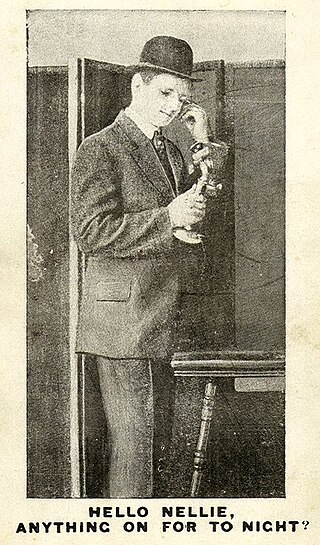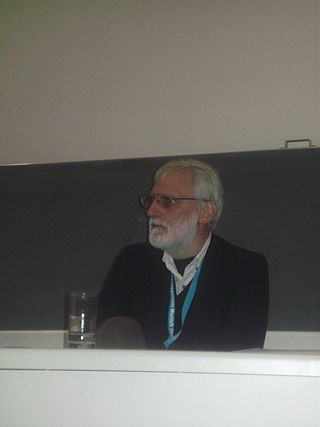Neutral monism is an umbrella term for a class of metaphysical theories in the philosophy of mind. These theories reject the dichotomy of mind and matter, believing the fundamental nature of reality to be neither mental nor physical; in other words it is "neutral".

Sentience is the capacity of a being to experience feelings and sensations. The word was first coined by philosophers in the 1630s for the concept of an ability to feel, derived from Latin sentientem, to distinguish it from the ability to think (reason). In modern Western philosophy, sentience is the ability to experience sensations. In different Asian religions, the word 'sentience' has been used to translate a variety of concepts. In science fiction, the word "sentience" is sometimes used interchangeably with "sapience", "self-awareness", or "consciousness".

A quiz is a form of game or mind sport in which players attempt to answer questions correctly on one or several specific topics. Quizzes can be used as a brief assessment in education and similar fields to measure growth in knowledge, abilities, and skills, or simply as a hobby. They can also be televised for entertainment purposes, often in a game show format.
Ylem is a hypothetical original substance or condensed state of matter, which became subatomic particles and elements as we understand them today. The term was used by George Gamow, his student Ralph Alpher, and their associates in the late 1940s, having resuscitated it from Middle English after Alpher found it in Webster's Second dictionary, where it was defined as "the first substance from which the elements were supposed to have been formed."

In the philosophy of mind, panpsychism is the view that the mind or a mindlike aspect is a fundamental and ubiquitous feature of reality. It is also described as a theory that "the mind is a fundamental feature of the world which exists throughout the universe." It is one of the oldest philosophical theories, and has been ascribed to philosophers including Thales, Plato, Spinoza, Leibniz, William James, Alfred North Whitehead, Bertrand Russell, and Galen Strawson. In the 19th century, panpsychism was the default philosophy of mind in Western thought, but it saw a decline in the mid-20th century with the rise of logical positivism. Recent interest in the hard problem of consciousness and developments in the fields of neuroscience, psychology, and quantum physics have revived interest in panpsychism in the 21st century.
Galen John Strawson is a British analytic philosopher and literary critic who works primarily on philosophy of mind, metaphysics, John Locke, David Hume, Immanuel Kant and Friedrich Nietzsche. He has been a consultant editor at The Times Literary Supplement for many years, and a regular book reviewer for The Observer, The Sunday Times, The Independent, the Financial Times and The Guardian. He is the son of philosopher P. F. Strawson. He holds a chair in the Department of Philosophy at the University of Texas, Austin, and taught for many years before that at the University of Reading, City University of New York, and Oxford University.
The hard problem of consciousness asks why and how humans have qualia or phenomenal experiences. This is in contrast to the "easy problems" of explaining the physical systems that give humans and other animals the ability to discriminate, integrate information, and so forth. Such problems are called easy because all that is required for their solution is to specify the mechanisms that perform such functions. Philosopher David Chalmers argues that even if we have solved all easy problems about the brain and experience, the hard problem will still persist.
Square is slang for a person who is conventional and old-fashioned, similar to a Fuddy-duddy. This sense of the word "square" originated with the American jazz community in the 1940s, in reference to people out of touch with musical trends. Older senses of the term square referring positively to someone or something honest and upstanding date back to the 16th century.

Hylozoism is the philosophical doctrine according to which all matter is alive or animated, either in itself or as participating in the action of a superior principle, usually the world-soul. The theory holds that matter is unified with life or spiritual activity. The word is a 17th-century term formed from the Greek words ὕλη and ζωή, which was coined by the English Platonist philosopher Ralph Cudworth in 1678.
A rabbet or rebate is a recess or groove cut into the edge of a piece of machinable material, usually wood. When viewed in cross-section, a rabbet is two-sided and open to the edge or end of the surface into which it is cut.

Property dualism describes a category of positions in the philosophy of mind which hold that, although the world is composed of just one kind of substance—the physical kind—there exist two distinct kinds of properties: physical properties and mental properties. In other words, it is the view that at least some non-physical, mental properties exist in, or naturally supervene upon, certain physical substances.
Philosophy is the study of general and fundamental problems concerning matters such as existence, knowledge, values, reason, mind, and language. It is distinguished from other ways of addressing fundamental questions by being critical and generally systematic and by its reliance on rational argument. It involves logical analysis of language and clarification of the meaning of words and concepts.

A stock tie, or stock, is a style of neck wear. Originally a form of neck-cloth that was often stiffened and usually close-fitting, formerly worn by men generally, but post-nineteenth century only in use in military uniforms. Another type of stock is worn by certain clergy and consists of black silk or other fabric, that falls over the chest and is secured by a band around the neck. Equestrians wear a stock tie around the neck when dressed formally for a hunt or certain competitive events. Most equestrian competition rules require it to be white. It is mandated attire for use in dressage and the dressage phase of eventing. Use of the stock tie also is seen in show jumping and fox hunting. The stock tie continues to be in fashion for equestrians.

Hello is a salutation or greeting in the English language. It is first attested in writing from 1826.
Milord is a term for an Englishman, especially a noble, traveling in Continental Europe. The term was used in both French and English from the 16th century. It apparently derives ultimately from the English phrase "my lord", which was borrowed into Middle French as millourt or milor, meaning a noble or rich man.
During the early part of the 17th century, and persisting in some form into the early 18th century, there were a number of proposals for an English Academy: some form of learned institution, conceived as having royal backing and a leading role in the intellectual life of the nation. Definite calls for an English Academy came in 1617, based on the Italian model dating back to the 16th century; they were followed up later, after the 1635 founding of the French Académie, by John Dryden (1664), John Evelyn (1665), and Daniel Defoe (1697).

William Edward Seager is a Canadian philosopher. He is a professor of philosophy at the University of Toronto, Scarborough. His academic specialties lie in the philosophy of mind and the philosophy of science.
Freedom is the power or right to act, speak, and change as one wants without hindrance or restraint. Freedom is often associated with liberty and autonomy in the sense of "giving oneself one's own laws",






